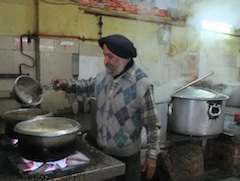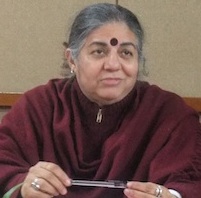| |
|
 |
Onion scandal in Mumbai highlights need for more sustainable farming
January 6, 2011:
 |
 |
 |
The kitchen of a Sikh gurdwara in Delhi where vegetarian food is served free to all comers. Photograph: Susie Weldon, ARC |
On the day ARC held its first Faith in Food consultation with religious representatives in Delhi, India’s TV stations were full of reports of the Mumbai onion scandal.
The price of onions – a staple of Indian cuisine – had gone up from 18 rupees per kilogramme in September to 55 rupees in December, at one time reaching a high of 80 rupees. It was a catastrophe for India’s poor, of whom 200 million are already considered to be undernourished.
Questions were being asked as to why 200 tonnes of onions imported from Pakistan had been allowed to rot while waiting for customs clearance. Were they deliberately allowed to rot to push up the price of onions? Was a false scarcity being created?
To the faith delegates discussing ARC’s Faith in Food initiative, the Mumbai onion scandal encapsulated so much that is wrong with our globalised, industrialised food system - a system in which food is a stock market commodity to be speculated upon for profit, traded in huge quantities and imported across vast distances.
 |
| “I do feel the situation is so severe that faith institutions really do need to bring faith back to food, so that we can reclaim faith in food.” |
|
 |
 |
It is a system in which the poor are exceptionally vulnerable to speculation, supply problems and price hikes, and which is neither sustainable nor resilient in terms of the environment and climate change.
As if to highlight the benefits of a more sustainable food system, it emerged that while the price of imported onions had shot up to 55 rupees per kg in Indian cities, locally grown onions were still selling for just 12 rupees per kg on city outskirts, close to farmland.
Faith in FoodDr Vandana Shiva, one of India’s leading environmental activists, said faith groups should speak out more on issues involving food. “Every faith talks about the economics of greed as being a sin. If you add it all up, it’s an unjust system. I think people of faith should see it as an outrage," she said.
Dr Shiva said she'd “felt sad for a very long time” that this area, which is so vital to all faiths, was not being addressed. “I think institutions of faith don’t realise the power they can exercise. They are not exercising it,” she told the delegates bluntly.
“I do feel the situation is so severe that faith institutions really do need to bring faith back to food, so that we can reclaim faith in food.”
 |
 |
 |
Dr Vandana Shiva at Faith in Food. Photograph: Ravneet Pal Singh, EcoSikh |
Indian agriculture was in crisis, with 200,000 farm suicides a year, she told the workshop delegates, who included representatives of Baha’ism, Christianity, Hinduism, Islam and Sikhism.
“We are running headlong into an agrarian disaster. For every farmer who dies, 10 are saying ‘I don’t want to farm any more’. And then there’s the youth who are getting a signal that it’s not worth going into farming. You can’t have a future for society where the signal is ‘give up farming’."
Sanctity of lifeEvery faith shared an understanding of the sanctity of life and the integrity of creation. Every faith also shared a sense of the importance of food, she added: “Every religion says feed the hungry. Every religion says feed good food – no one says give bad food to the poor, no one says let your neighbour starve.”
Another value common to all faiths was peace and non-violence to all beings: “Now if that is a faith element and a faith principle, then non-violent farming is a very natural outcome of that principle,” she said.
“We have to promote non-violent farming and the only way you can farm non-violently is by getting rid of the chemicals that cause violence and by getting rid of the [genetically modified] seeds which are both bred through violence and breed violence.”
AfterwordIn the days after the Faith in Food workshop, the Mumbai onion scandal was still causing trouble - this time across the border in Pakistan.
The price of the staple vegetable had more than doubled in Pakistan in recent weeks, sparking complaints from consumers. The Government blamed the high level of exports which it said had triggered a shortage at home. Pakistan has now banned overland onion exports to India in an attempt to control rising prices at home.
The latest twist in the Mumbai onion scandal was yet another reminder of how globalised the intensive food industry has become - and how deeply unsustainable it is in the long-term.
Check out the new Faith in Food blog for the latest news and updates - Link here.
|
 |
 |
|
|
|
|
|
 |
December 31 2010:
PRESS RELEASE: Faith in Food next stop: New Delhi
Vandana Shiva is one of the participants in our Faith in Food seminar in New Delhi on Monday |
 |
November 10, 2020:
Sacred Soil: the foundation of life
We rarely think about the soil beneath our feet; we certainly don’t consider that one inch of "dirt" contains billions of living organisms or that healthy soil is literally the foundation of life. That sacred connection between soil, life, faith and our relationship with all creation was the theme of this year’s 15th annual Festival of Faiths at Louisville, Kentucky. |
 |
April 25, 2012:
Making Buddhist teachings on protecting nature more relevant
"Sometimes we in the faiths strive too hard to make our teachings and traditions relevant to the modern world. In the case of Buddhism I don't think this is necessary. The core teachings of Buddhism about illusion, reality and the nature of compassion are eternal. They are truths we need to hear today as much as in the time of the historical Buddha" - Martin Palmer at the 3rd World Buddhist Forum, Hong Kong |
 |
 |
|
|

